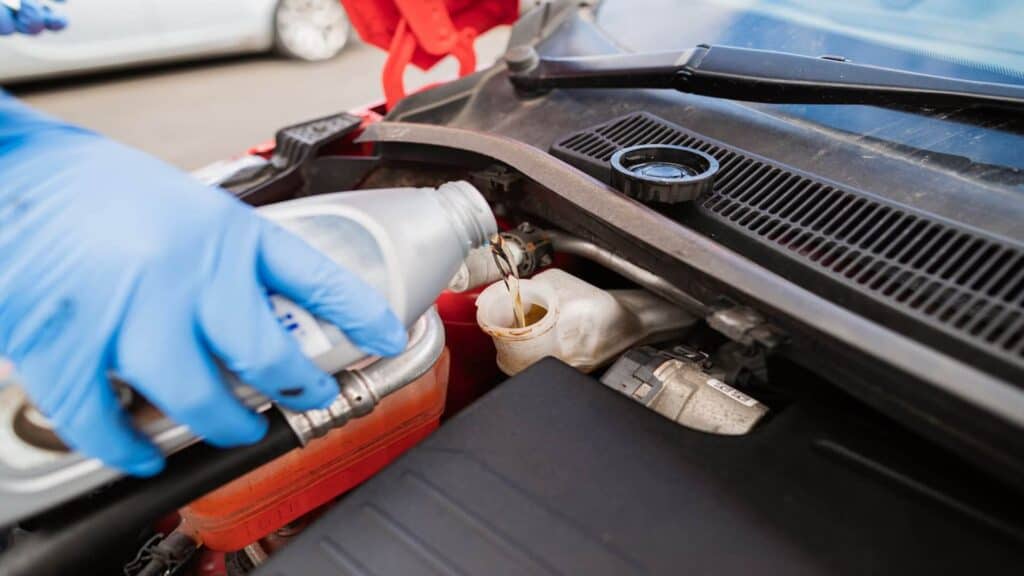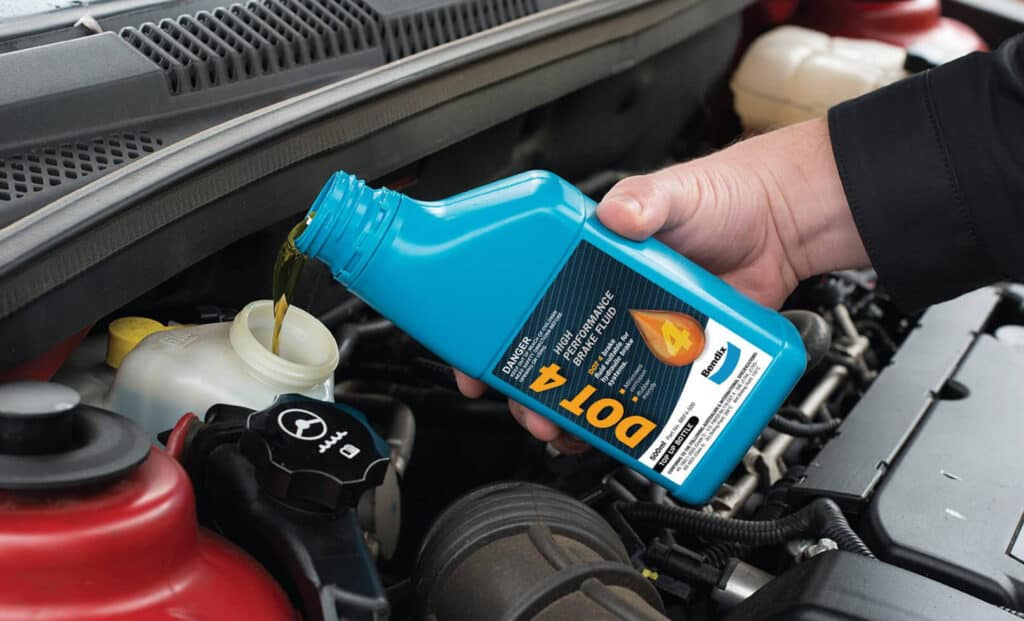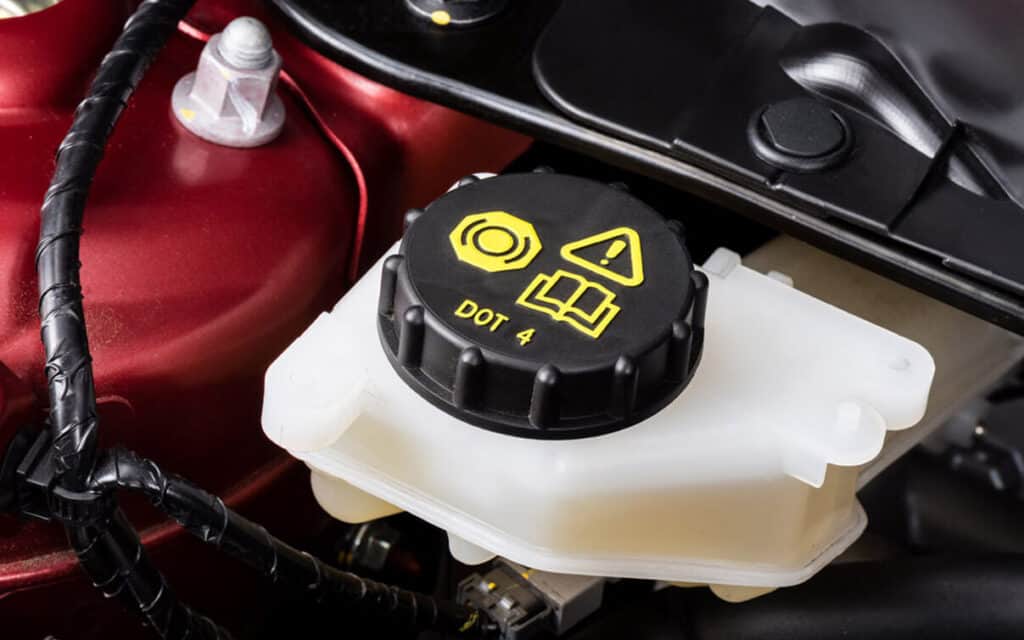Introduction
Ever felt that shudder down your spine when your car’s brakes refuse to respond at a traffic signal or on a downhill slope? A malfunctioning brake system can pose severe threats, not just to you, but everyone around you on the road. The root cause? Often, it’s as simple as contaminated or faulty brake fluid.
What is a Brake Fluid Flush and Refill?
A brake fluid flush and refill, also known as bleeding the brakes, involves removing all the existing brake fluid in the system and replacing it with new fluid. This service is crucial as it ensures your vehicle’s brake system is free from air, moisture, and contaminants that can affect brake performance and damage brake components.

How Much Will it Cost to Perform a Brake Fluid Flush and Refill in Canada?
The cost of a brake fluid flush and refill in Canada varies based on the make and model of your vehicle and the pricing of the service center. On average, you can expect to pay between $70 and $150. This includes parts (around $20 for brake fluid), labour (typically 1 to 2 hours), and labour cost at approximately $50 to $100 per hour.
What are the Symptoms of Contaminated or Faulty Brake Fluid?
• Decreased Braking Performance: If the brake fluid is contaminated, it may cause the brakes to feel spongy or less responsive than usual.
• Brake Warning Light: Many vehicles have a warning light on the dashboard that will illuminate if there is an issue with the brake system, such as contaminated brake fluid.
• Strange Noises: If you hear a grinding or squealing noise when applying the brakes, it could be a sign of contaminated brake fluid.
• Leaking Fluid: Leaking brake fluid can be a clear sign of a problem. The fluid is usually clear to yellowish in color and has a medium thickness.
• ABS Light Activation: If your vehicle’s Anti-Lock Braking System (ABS) light comes on, it could indicate a problem with the brake fluid.
• Corrosion or Damage to Brake Parts: Contaminated brake fluid can cause corrosion or damage to your vehicle’s brake system parts. If you notice any visible damage, it’s important to get it checked out immediately.
How Long Does Brake Fluid Last?
Brake fluid generally lasts between 2 to 3 years, or around 48,000 to 72,000 kilometers, depending on the type of fluid used and the driving conditions. This time frame is not definitive and the fluid should be checked at regular intervals.
How Does Brake Fluid Become Contaminated or Defective?
• Absorption of Moisture: Brake fluid is hygroscopic, meaning it absorbs moisture from the atmosphere over time. This can cause the fluid to degrade and reduce its boiling point, leading to decreased braking performance.
• Deterioration of Brake System Components: Over time, the components of the brake system can wear down, leading to tiny particles contaminating the brake fluid.
• Exposure to High Temperatures: Regular braking, especially in high-performance or heavy-duty vehicles, can cause the brake fluid to heat up to high temperatures. Over time, this can break down the fluid, reducing its performance.
• Lack of Regular Maintenance: If the brake fluid is not regularly flushed and replaced, it can become contaminated with dirt and debris.
• Use of Incorrect Fluid Type: If the wrong type of brake fluid is used, it can lead to compatibility issues and degradation of the fluid.

How Can Contaminated Brake Fluid Affect Other Systems in the Car?
• Corrosion of Brake System Components: Contaminated brake fluid can lead to corrosion and damage of critical brake system components, such as the master cylinder, calipers, and brake lines.
• ABS System Damage: Modern vehicles are equipped with Anti-lock Braking Systems (ABS) that are sensitive to dirty or degraded brake fluid. Contaminated fluid can impair the operation of the ABS, causing it to malfunction.
• Reduced Brake Effectiveness: Contaminants in the brake fluid can decrease its boiling point, leading to a condition known as brake fade. This condition makes the brakes less effective, especially under hard or prolonged use.
• Increased Wear and Tear: Contaminated brake fluid can lead to increased wear and tear on the braking system, causing parts to fail prematurely.
• Potential Damage to Clutch System: In vehicles where the clutch system uses the same fluid as the braking system (brake fluid), contaminated brake fluid can also negatively affect the performance of the clutch
Is it Safe to Drive with Contaminated or Faulty Brake Fluid?
The safety of your vehicle on the road largely depends on the effectiveness of its braking system, and the integrity of the brake fluid is pivotal to this system. Driving with contaminated or faulty brake fluid can lead to unpredictable brake performance, possibly endangering you, your passengers, and other road users. Contaminated brake fluid can cause the brake pedal to feel spongy and less responsive, potentially increasing your stopping distance, which could result in accidents, especially in emergency situations. Therefore, it is not safe to drive your car if you suspect that the brake fluid is contaminated or faulty.
Moreover, contaminated brake fluid can cause damage to the brake system over time. When moisture infiltrates the brake fluid, it can cause parts such as the master cylinder and brake lines to rust and corrode. This could lead to a costly repair or, worse, a brake system failure while driving. Brake fluid can also degrade over time due to high temperatures, which can reduce its effectiveness. The bottom line is that contaminated or faulty brake fluid should not be ignored. If you notice any signs of issues with your brake fluid or brake performance, it’s crucial to get your vehicle inspected by a professional mechanic immediately.
How Can I Make My Brake Fluid Last Longer?
• Regular Checks: Check the brake fluid level and color regularly. Dark-colored fluid may indicate contamination.
• Timely Replacement: Follow your vehicle manufacturer’s recommendations for brake fluid replacement.
Use Quality Fluid: Always use high-quality brake fluid specified for your vehicle.
• Seal the Brake Fluid Container: Always tightly seal the brake fluid container to prevent moisture ingress.
Can a Mobile Mechanic Perform a Brake Fluid Flush and Refill?
Absolutely! Many mobile mechanics are equipped to perform brake fluid flushes and refills. This service is convenient as it can be done at your home or workplace, saving you a trip to the auto repair shop.

Conclusion: Importance of Regular Brake Fluid Flush and Refill
In conclusion, maintaining your brake fluid isn’t just about preserving your vehicle’s brake system; it’s about ensuring your safety on the road. Regular brake fluid flushes and refills should be part of your routine vehicle maintenance. So, keep an eye on those brakes. After all, better safe than sorry!
Next Steps
Book Your Brake Fluid Flush and Refill Service
The service most frequently booked by those who read this article is Brake Fluid Flush and Refill. Uchanics’ expert technicians make the process even more convenient by bringing the service right to your doorstep. We perform this job at your home or office, covering over 40 cities in Ontario, including Oshawa, Ajax, Toronto, Scarborough, Mississauga, Brampton, and more. Our commitment to excellence has earned us more than 700 glowing 5-star reviews. Choose Uchanics for your Brake Fluid Flush and Refill and experience unparalleled convenience and top-quality service.
